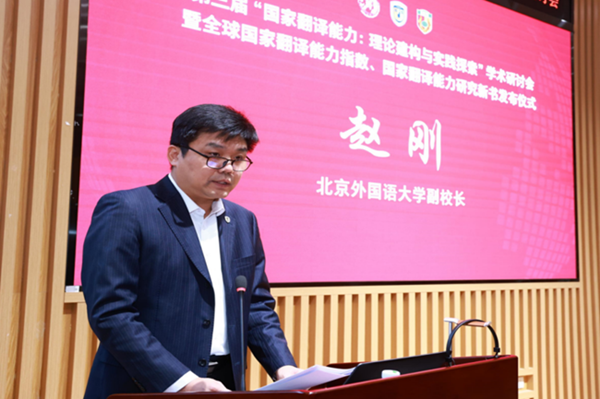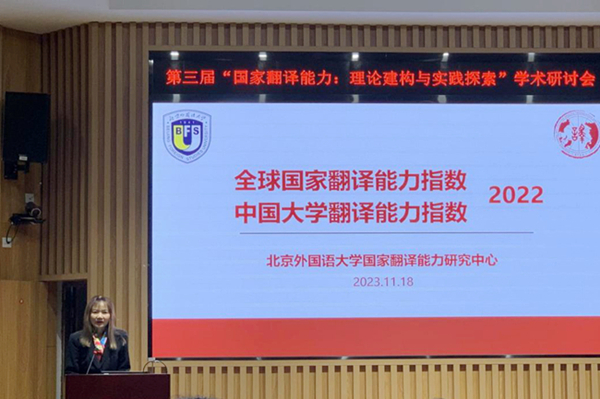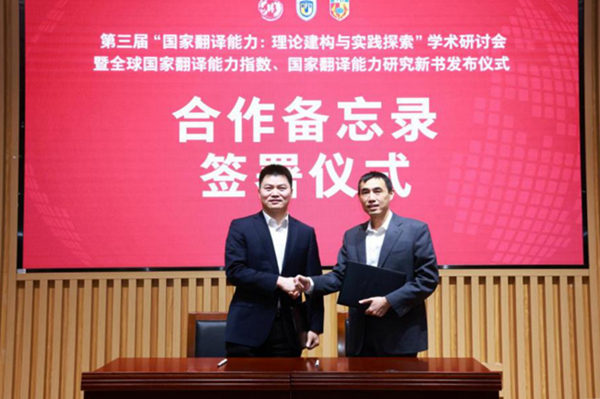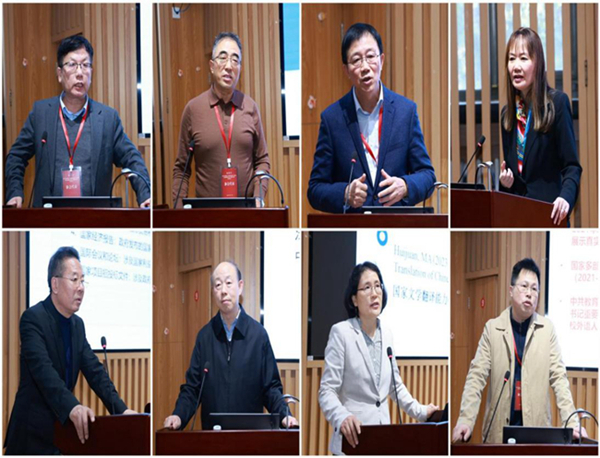- Research
- Research Centers
- Journals
- Admission
- Introduction
- Programs
- Application
- Alumni & Giving
- Alumni Club
- Giving
The third Country-specific Translation Competence Seminar: Theoretical Construction and Practical Exploration was held from Nov 18 to 19.
Hosted by Beijing Foreign Studies University (BFSU) and organized by the BFSU Research Centre for Country-specific Translation and Interpretation Capacity (RECTIC) and the Graduate School of Translation and Interpretation at the university, the seminar attracted nearly 200 representatives from dozens of universities and institutions across China.

Zhao Gang, a member of the standing committee of the CPC BFSU committee and vice-president of the university, delivers a speech at the opening ceremony of the seminar. [Photo/bfsu.edu.cn]
In his opening address, Zhao Gang, a member of the standing committee of the CPC BFSU committee and vice-president of the university, urged in-depth discussions on the theoretical construction and practical exploration of country-specific translation competence for the advancement of research in this field.
He encouraged interdisciplinary communication and collaboration to address crucial issues faced by the translation discipline, and emphasized the need to focus on the development trends of professional disciplines, especially the challenges and opportunities brought about by the advancements in translation technologies.

Ren Wen, director of the RECTIC and dean of the Graduate School of Translation and Interpretation at BFSU, releases the translation competence indices in 2022. [Photo/bfsu.edu.cn]
Ren Wen, director of the RECTIC and dean of the Graduate School of Translation and Interpretation at BFSU, presented the translation competence indices of 193 countries around the world and 469 Chinese universities in 2022. Her report emphasized the multidimensional differences in translation competence between China and the United States.
Ren proposed that China should strive to maintain its advantage in translation development while further enhancing its translation management capabilities.
The indices show that, in 2022, the top 20 countries in global translation competence are the United States, China, the United Kingdom, Germany, Spain, Australia, Austria, Canada, Italy, France, Finland, Poland, Belgium, Japan, Ireland, South Korea, Switzerland, Sweden, Denmark, and Norway.
The top 20 universities on the Chinese mainland in terms of their translation abilities are the following: BFSU, Shanghai International Studies University, Guangdong University of Foreign Studies, Xi'an International Studies University, Beijing Language and Culture University, Peking University, Fudan University, Sun Yat-sen University, the University of International Business and Economics, Xiamen University, Nanjing University, Sichuan International Studies University, Zhejiang University, Wuhan University, Dalian University of Foreign Languages, East China Normal University, Sichuan University, Renmin University of China, Nankai University and Hunan Normal University.
The top 10 universities in the Hong Kong and Macao special administrative regions and Taiwan with the strongest translation competence are: Hong Kong Baptist University, National Taiwan University, the Chinese University of Hong Kong, the University of Macau, National Taiwan Normal University, the Hong Kong Polytechnic University, the University of Hong Kong, City University of Hong Kong, Lingnan University and Macao Polytechnic University.
Ren also released two books, A Study on National Translation Capacity: Theory and Practice published by the Commercial Press and Collaboration in the World of Translation and Interpreting published by the Foreign Language Teaching and Research Press, which are significant milestones in BFSU's construction of a world-class university and first-class disciplines.

The Academy of Translation and Interpretation of China International Communications Group (CICG) and BFSU’s Graduate School of Translation and Interpretation, represented by Xing Yutang (L), deputy director of the academy, and Yao Bin, vice-dean of the school, sign a memorandum of cooperation. [Photo/bfsu.edu.cn]

Eight professors from renowned universities in China give keynote speeches at the seminar. [Photo/bfsu.edu.cn]
During the keynote speech session, eight professors gave speeches covering such topics as overseas-targeted publicity translation, constituents and development paths of national translation competence, China's national science and technology translation in ancient times and translator competence in the new era.
The seminar also included six thematic forums and two graduate student academic forums, as well as a chief editor forum featuring discussions on scholars' growth, topic selection, writing norms, paper submissions, selection standards and peer reviews.